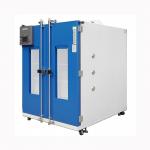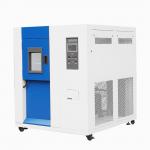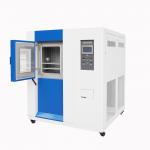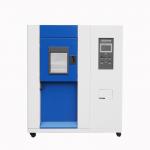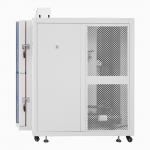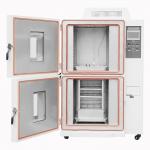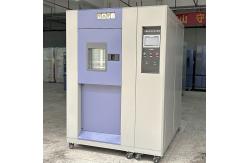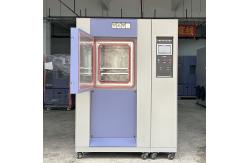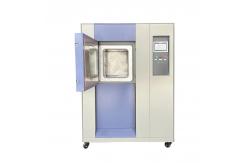In the realm of military technology, where reliability and
performance in extreme conditions are non-negotiable, the Custom
Thermal Shock Chambers designed to meet Military Standard 810G,
Method 509.5 test standards stand as a testament to precision
engineering and innovation. This custom-built thermal shock chamber is dedicated to subjecting
military equipment and components to the exacting thermal shock
testing requirements of Military Standard 810G, Method 509.5. It
serves a crucial role for defense contractors, military research
facilities, and the armed forces themselves. The primary aim is to
evaluate the ability of a wide range of items, from sensitive
electronics and optical systems to rugged mechanical assemblies, to
endure rapid and severe temperature changes. By replicating the
thermal shock scenarios that military assets may face during their
operational lifetimes, such as those encountered during rapid
altitude changes, transitions between different climate zones, or
in the vicinity of heat-generating equipment, manufacturers can
identify design weaknesses, optimize materials and manufacturing
processes, and enhance the overall durability and mission-readiness
of military equipment. - Robust and Insulated Chamber Design
- The chamber is constructed with heavy-duty, heat-resistant
materials that can withstand the intense thermal stresses. The
walls are made of high-strength alloy steel, combined with advanced
thermal insulation layers to minimize heat transfer between the hot
and cold zones. The door is engineered with a reliable sealing
mechanism and a viewing window, allowing operators to monitor the
testing process without compromising the chamber's integrity. The
interior is designed with adjustable racks and fixtures, enabling
the accommodation of variously sized and shaped military components
and ensuring uniform exposure to the thermal shock conditions.
- Precision Temperature Control and Cycling System
- Temperature Range and Cycling: Capable of achieving a wide
temperature range, typically from -70°C to +150°C. The system can
execute rapid temperature cycling between the hot and cold zones,
with a transition time as short as a few seconds. This is essential
for mimicking the abrupt temperature changes that military
equipment may experience. The temperature control is accurate to
within ±0.2°C, providing highly reliable and repeatable test
results.
- Programmable Temperature Profiles: The chamber's control system
allows for the creation and execution of complex, custom
temperature profiles. Operators can define specific temperature
levels, dwell times in each zone, and the sequence and number of
thermal shock cycles to replicate a diverse range of real-world
military operational conditions. This flexibility enables
comprehensive testing of components under different
mission-critical scenarios.
- Intuitive Control Panel and Data Acquisition Interface
- The control panel is designed for ease of use by military
technicians and engineers. It offers a user-friendly interface that
allows effortless setting and adjustment of all test parameters,
including temperature, cycling times, and equipment identification.
The panel also provides real-time displays of the current
temperature in both zones, the status of the testing process, and
any alarms or warnings. The chamber is integrated with a
comprehensive data acquisition system that records all relevant
test data. This includes detailed temperature histories, cycle
counts, and any observable changes in the physical, electrical, or
mechanical properties of the tested components. The data can be
stored in a secure, encrypted format in the chamber's built-in
memory or exported to external military-approved storage devices
for in-depth analysis and reporting. The system can also generate
detailed test reports in various standardized military formats.
- Enhanced Safety and Security Features
- To ensure the safety of operators and the protection of sensitive
military test samples and the chamber itself, a suite of advanced
safety and security features is incorporated. These include
multiple layers of over-temperature and over-current protection,
emergency stop buttons with redundant circuitry, and alarms for any
abnormal temperature fluctuations, equipment malfunctions, or
security breaches. The chamber is also equipped with access control
mechanisms, such as biometric authentication or smart card readers,
to prevent unauthorized access and safeguard classified testing
activities. Additionally, it has a self-contained fire suppression
system and proper ventilation and exhaust mechanisms to handle any
potentially hazardous gases or vapors that may be generated during
testing.
- Temperature Range and Accuracy
- The -70°C to +150°C temperature range with ±0.2°C accuracy provides
a comprehensive and precise testing environment. Military equipment
often operates in a wide variety of temperature extremes, and this
accurate temperature control ensures that the test conditions
closely match the demands of Military Standard 810G, Method 509.5.
For example, electronic components in a missile guidance system
must function accurately in both the frigid cold of high-altitude
flight and the intense heat generated during launch and operation.
- Thermal Shock Cycle Parameters
- The chamber can be programmed to perform a customizable number of
thermal shock cycles, ranging from a few dozen to several thousand,
depending on the specific requirements of the military equipment
and its expected service life. The dwell time in each temperature
zone can be adjusted from milliseconds to hours, allowing for the
simulation of a vast array of mission profiles. For instance, a
reconnaissance drone may experience short, frequent thermal shock
cycles during its flight operations, while a stationary military
communication station may endure longer, less frequent cycles.
- Testing Volume and Payload Capacity
- The chamber offers a flexible testing volume, usually ranging from
3 m³ to 15 m³, to accommodate a wide variety of military equipment
and components, from small circuit boards to large weapon systems.
The payload capacity is designed to handle heavy and bulky items,
with a maximum capacity of up to several tons, ensuring that even
the most substantial military hardware can be effectively tested.
|
